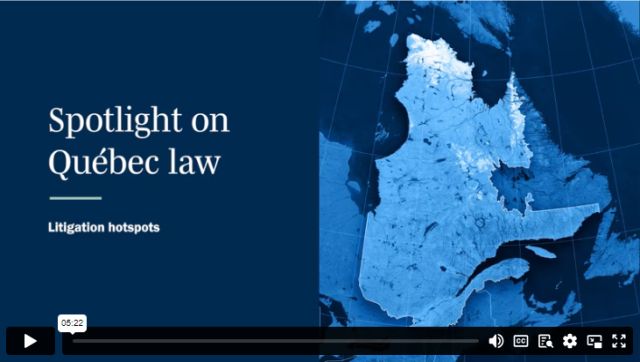Video transcript
Christopher Richter (00:05): Hi, I'm Christopher Richter, a litigation partner at Torys, and I'm here today with partner Julie Himo. We'd like to give you a sense of what we're seeing in the world of disputes and investigations from where we sit in Torys' Montréal office. Today we're going to highlight trends in contractual disputes, D&O liability, regulatory proceedings and how that can turn into class action risk as well.
Julie, I'd like to start by discussing good faith and the interpretation of contracts, which is something that has been front and center in a lot of cases recently. One thing that I've found interesting is the idea of a relational contract, where invoking good faith is becoming more common, I think.
Julie Himo (00:43): Yes, a relational contract is one involving a long-term relationship between parties who pursue a common objective through close cooperation and mutual trust. Good faith was invoked in the case of Bombardier v. Honeywell International to inform the duties of the parties. Honeywell was obliged to negotiate in good faith a reduction in price if the cost of its engines made Bombardier's planes uncompetitive.
It's on appeal, so we'll see what happens in that matter. The Superior Court cited the Supreme Court's recent decision in Ponce v. Rhéaume, which was also arguably a relational contract. It seems that good faith can even impose positive obligations. Is this a new trend, Chris?
Christopher Richter (01:26): Well, I don't think we can really call it a new trend, but good faith extends the obligations agreed to include duties like a duty to inform in some situations. And the Supreme Court said in that case that good faith imposes an "obligation of contractual loyalty". It does not mean that you need to act according to the interests of the other party, but you need to take those interests into account in the execution and performance of your contract.
And this has a proactive dimension as well that includes a duty to provide information to the other party to facilitate its performance of the contract.
Julie Himo (02:01): That means it is even more important to include good contractual limitations of liability, which will be enforced unless there is gross negligence or fraud as described in the Prelco case. D&O are also increasingly at risk for regulatory liability. One of the trends we are seeing is more efficient assertion of jurisdiction by regulatory authorities in the civil and commercial courts. Chris, you've got a few examples of that from Québec.
Christopher Richter (02:26): That's right, Julie. Courts are strained, very busy, and they're striving to remove barriers to efficient decision making. They don't have a lot of patience for jurisdictional squabbles these days.
In the case of Sharp and Autorité des marchés financiers, which is the Québec Securities Commission, the Supreme Court recognized the jurisdiction of Québec's Financial Markets Administrative Tribunal to hear complaints brought by the AMF against persons outside of Québec, where there's a sufficient connection to the province, and this test appears to apply to any provincial regulatory authority—not just Québec regulatory authorities, but any—extending their reach across Canada and even internationally, where the conduct has a sufficient connection to the province.
Julie Himo (03:09): So, I want to ask you, Chris. Regulatory risk is one thing, but is class action risk even greater for some statutory violations?
Christopher Richter (03:16): Yeah, we're seeing a lot of class action plaintiff counsel turning regulatory violations into class action claims. The new prohibition on drip pricing in the Federal Competition Act is one example. Drip pricing has been a favorite under the Québec CPA for a long time, but the recent amendments to the Federal Competition Act means that the risk exists across Canada.
It sometimes seems that any ambiguity in online disclosure or representations made on websites can be grounds for a new class action, and this only seems to be growing. Julie, in your privacy and cybersecurity practice, I know you've got some other examples of this as well.
Julie Himo (03:51): Yes, the proliferation of privacy related class actions in 2023 continued the trend of plaintiffs seeking compensation for data breaches affecting the personal information of customers, employees and other parties held by organizations in Québec. In 2023, for example, six new class actions pertaining to privacy and personal information were filed in Québec.
While some privacy class proceedings were certified in the past, courts have strictly scrutinized the viability of data breach-based claims. Class counsels are increasingly struggling to convince the courts to certify these claims. Because of that, what we see in terms of trends for the coming years will be class actions for mishandling of personal information and failure to comply with the new regulatory requirements under Bill 25, our new privacy law in Québec.
What an organization can collect, use and share needs to be seriously considered as the risks that individuals will feel that they never agreed to a specific practice will increase. The use of AI and its potential sources of liability are also trends. Organizations are more than ever trying to monetize data which they hold, generate, or can purchase from third parties. This trend will certainly lead to an increase in class actions resulting from data collection and use practices.
A few have been filed in Québec so far, including those involving Flo Health, Home Depot and Whaleco, but there will certainly be more to come.
Three major litigation hotspots are emerging in Québec. In this video, Christopher Richter and Julie Himo discuss:
- How good faith is front and center in more and more contract disputes
- The expanding reach of Québec regulators to capture conduct sufficiently connected to the province
- How regulatory violations are proving fertile ground for Québec class actions—from drip pricing to privacy breaches like the misuse of personal data, including by AI tools
Click here to see other videos in this series.
The content of this article is intended to provide a general guide to the subject matter. Specialist advice should be sought about your specific circumstances.



